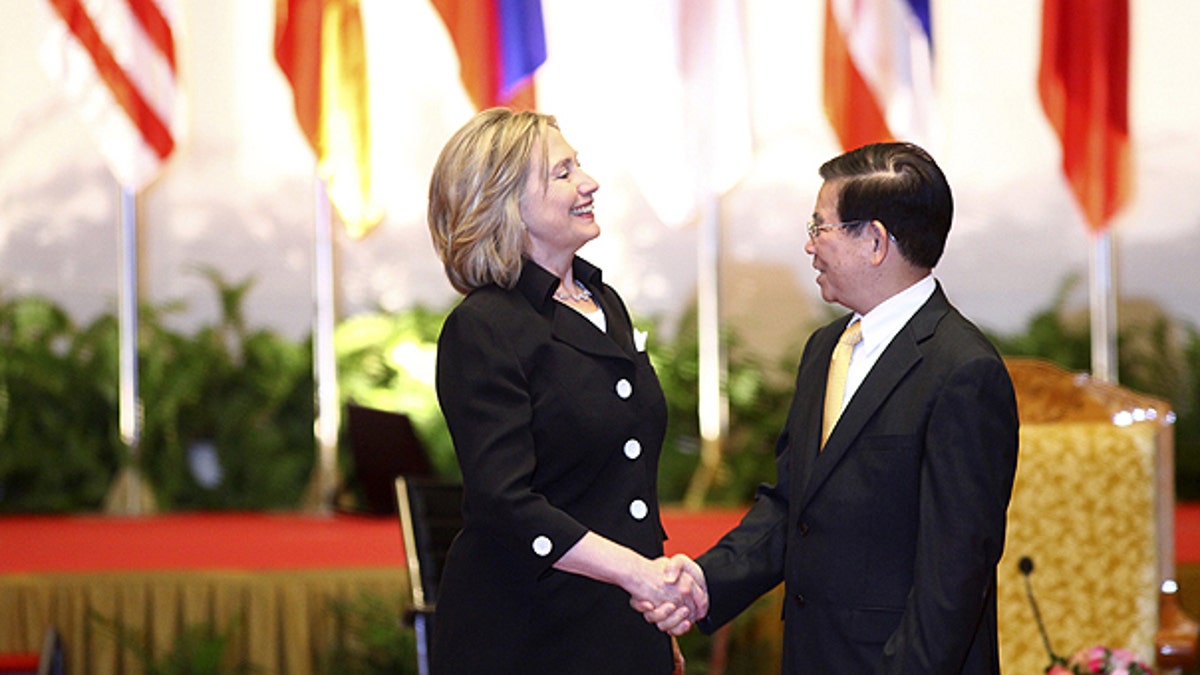
Oct. 30: Secretary of State Hillary Rodham Clinton, left, is greeted by Vietnamese President Nguyen Minh Triet on the sidelines of the 17th ASEAN Summit in Hanoi, Vietnam. (AP)
HANOI, Vietnam -- U.S. Secretary of State Hillary Rodham Clinton waded into a fresh spat between China and Japan on Saturday, saying the United States has a key stake in territorial disputes between Beijing and its neighbors and will remain a major power in the Asia-Pacific region.
In a speech to East Asian leaders in Vietnam, Clinton declared that America has a direct national security interest in seeing peaceful resolutions to competing claims over islands that have led to a spike in animosity between China and other countries in the region, notably U.S. ally Japan.
"The United States has a national interest in the freedom of navigation and unimpeded lawful commerce," Clinton told a meeting of the East Asia Summit in Hanoi. "And when disputes arise over maritime territory, we are committed to resolving them peacefully based on customary international law."
Her comments come as China and Japan's damaged relations took a fresh hit, dimming hopes for talks between the two regional powers and highlighting tensions that have rattled nerves across the Asia-Pacific.
Sino-Japanese relations appeared to be mending when Chinese Foreign Minister Yang Jiechi and his Japanese counterpart Seiji Maehara met on the sidelines of the summit on Friday, paving the way for expected talks between the countries' two leaders.
But at the last minute, China called off the meeting and blasted Japan, accusing it of making untrue statements about islands in the East China Sea, claimed by both nations. The territory is at the heart of the dispute, following a collision there last month between a Chinese fishing trawler and two Japanese patrol boats.
The row that followed included protests, canceled meetings and Chinese restrictions on key metal exports that drew international concern, including from the United States.
Chinese Assistant Foreign Minister Hu Zhengyue told reporters in Hanoi that Japan was turning the contested islands -- called Diaoyu in China and Senkaku in Japan -- into a "hot topic" on the sidelines of the summit hosted by the 10-member Association of Southeast Asian Nations, or ASEAN, by talking to the media and holding discussions with other countries prior to the meeting.
"The Japanese side should take responsibility for ruining the atmosphere for leaders of the two countries," he said.
The U.S. has appealed for the two countries to resolve the matter peacefully but has made clear it sides with Japan in the current imbroglio. After meeting with Japan's foreign minister in Hawaii on Wednesday, Clinton said the islands are covered by a U.S.-Japan mutual security pact, although Washington takes no position on their ultimate sovereignty.
That infuriated Beijing, which on Friday said it was "strongly dissatisfied" with her comments and lashed out at both the U.S. and Japan.
Southeast Asian countries have become increasingly rattled in recent months following a number of aggressive maritime moves by the Communist giant.
Clinton's message, while couched in diplomatic niceties, was clear: China must not use its growing economic and military strength to bully its neighbors. Previous similar remarks from Clinton and other U.S. officials have drawn tough criticism from the Chinese, who claim sovereignty over vast swaths of territory in the East and South China seas.
She praised China for taking some steps to engage with its neighbors about setting up a formal and binding code of conduct in dealing with the disputes, which extend to other strategic and potentially oil-rich islands in the region. But aides said her remarks were a signal to China that the U.S. is looking for far more.
In her comments to the summit, Clinton said the U.S. had no intention of relinquishing its role as a dominant power in the Asia-Pacific, asserting that "we will continue to leverage the strength of our bilateral relationships (and) continue expanding our emerging partnerships with a wide range of countries."
